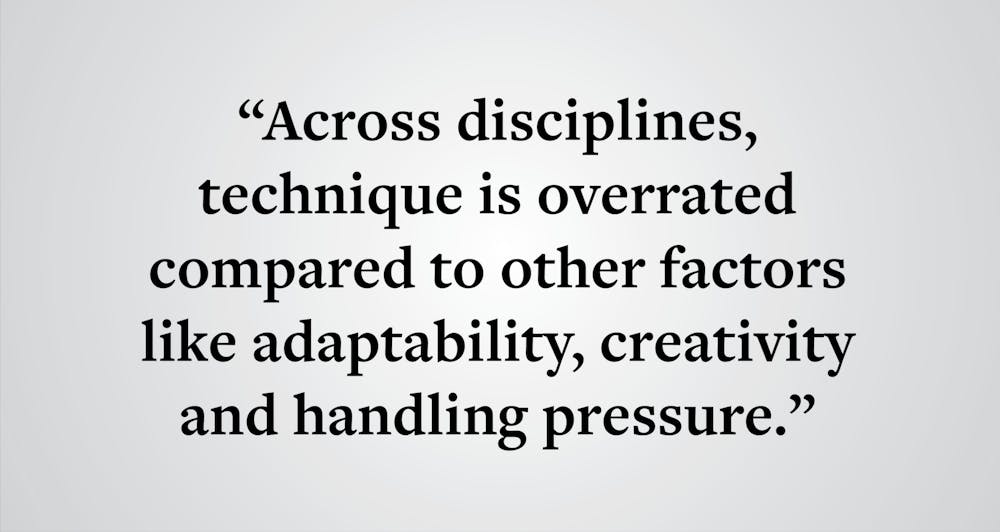South African mixed martial artist Dricus du Plessis was completely written off heading into his fight against former champion Robert Whittaker. Analysts labeled du Plessis “slow,” “mediocre” and lacking in basic kickboxing and wrestling techniques. Oddsmakers deemed him a massive underdog. Yet from the moment the two fighters stepped into the octagon, the “unskilled” du Plessis dominated Whittaker.
Du Plessis didn’t stop there. He went on to capture the title and then defend it against all-time great Israel Adesanya. As it stands, he has not lost in nearly six years.
Why is du Plessis so successful? His fighting style is creative. He is simply in better shape than other fighters. He is good under pressure. Essentially, he excels in all non-technical aspects of the sport.
Professional fighting seems like the last place where one could succeed without technical skill — after all, the price for lacking technique is being repeatedly punched in the face. Yet, as du Plessis proves, that’s not the case. He exemplifies a broader truth: Across disciplines, technique is overrated compared to other factors like adaptability, creativity and handling pressure.
Many popular music artists gain popularity more for their personality, creativity and willingness to experiment than for their technical musical skills. This fact is best highlighted by the starkly different career outcomes of contestants who have won the TV singing competitions “The Voice” and “American Idol.”
“The Voice” is designed to reward technical singing excellence. In each episode, contestants give a minute-and-a-half rendition of a song of their choice to a panel of judges, who sit facing away from the stage. The idea is that they evaluate only the singer’s voice, free from biases related to appearance or stage presence. “American Idol” follows a similar format but allows judges to see the contestants, focusing not just on their vocal ability but also their stage presence and personality.
Despite the similar prizes attached to both shows, none of the 24 winners of “The Voice” have won any Grammy awards. Meanwhile, in fewer seasons, “American Idol” has produced many household names, including Grammy-winners like Carrie Underwood and Kelly Clarkson. As these singing competitions illustrate, success in creative fields depends more on charisma and audience connection than on raw technical skill.
Even activities that may appear to be straightforward tests of technique do not always reward the most technically skilled people. Technical software engineering coding interviews are thought of as broad tests of coding skills, and Brown students spend hours poring over Leetcode practice problems in dark corners of the CIT in preparation. But these interviews are unfortunately more of a test of candidates’ ability to handle performance anxiety rather than their raw coding skills, a North Carolina State University study found. On average, coders perform twice as well in a room alone than in one with an interviewer peering over their shoulder and nitpicking their programs. Thus, the few coders that handle this pressure well enjoy a huge advantage, though they are not necessarily better technically suited for the job than their competitors.
I came to understand the relative unimportance of technique through my experiences playing competitive tennis. My first coach believed in the “correct” grip, the “correct” swing and the “correct” shot for every situation. While he was a good teacher, I struggled to win tournaments under his tutelage. Eventually, I switched to a new coach, Blake, whose philosophy was that once a player had a strong understanding of the fundamentals, factors like strategy, creativity and staying calm under pressure mattered far more than technical precision.
Within my first year of working with Blake, my Universal Tennis Rating improved by nearly 1.5 points — a difference roughly equivalent to the gap between the all-time great Novak Djokovic and the 100th-ranked player in the world.
Blake’s teachings apply to college, as well. We like to think that the best students are the ones who master every formula, memorize every fact and then regurgitate it all perfectly on test day. But, in reality, the students who stand out aren’t necessarily the most technically skilled; they’re the ones who ask thought-provoking, strategic questions, make creative connections between subjects and stay composed whether they are presenting in front of 100 other students or defending a thesis in front of a thesis committee.
Ultimately, regardless of the field, you should find an approach that suits you. Don’t worry about being “technically” correct — it only overcomplicates things. Or, as the great philosopher Dricus du Plessis put it: “Footwork is not important. You start running towards your opponent and throw (punches or kicks) at him — just throw. Whatever he throws? Yeah, take it. And then throw what you want to throw.”
Ben Aizenberg ’26 can be reached at benjamin_aizenberg@brown.edu. Please send responses to this column to letters@browndailyherald.com and other opinions to opinions@browndailyherald.com.





